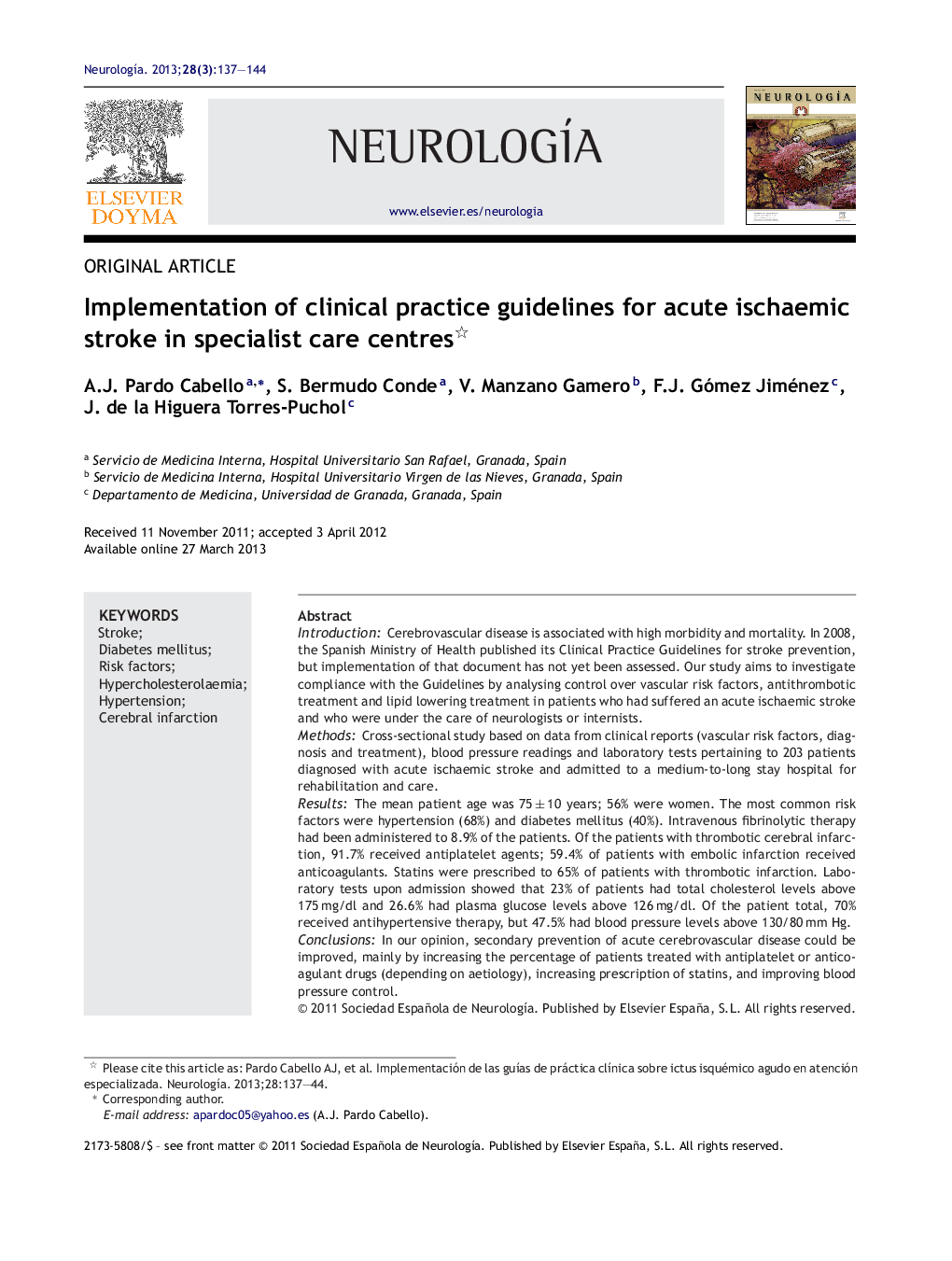| Article ID | Journal | Published Year | Pages | File Type |
|---|---|---|---|---|
| 3077681 | Neurología (English Edition) | 2013 | 8 Pages |
IntroductionCerebrovascular disease is associated with high morbidity and mortality. In 2008, the Spanish Ministry of Health published its Clinical Practice Guidelines for stroke prevention, but implementation of that document has not yet been assessed. Our study aims to investigate compliance with the Guidelines by analysing control over vascular risk factors, antithrombotic treatment and lipid lowering treatment in patients who had suffered an acute ischaemic stroke and who were under the care of neurologists or internists.MethodsCross-sectional study based on data from clinical reports (vascular risk factors, diagnosis and treatment), blood pressure readings and laboratory tests pertaining to 203 patients diagnosed with acute ischaemic stroke and admitted to a medium-to-long stay hospital for rehabilitation and care.ResultsThe mean patient age was 75 ± 10 years; 56% were women. The most common risk factors were hypertension (68%) and diabetes mellitus (40%). Intravenous fibrinolytic therapy had been administered to 8.9% of the patients. Of the patients with thrombotic cerebral infarction, 91.7% received antiplatelet agents; 59.4% of patients with embolic infarction received anticoagulants. Statins were prescribed to 65% of patients with thrombotic infarction. Laboratory tests upon admission showed that 23% of patients had total cholesterol levels above 175 mg/dl and 26.6% had plasma glucose levels above 126 mg/dl. Of the patient total, 70% received antihypertensive therapy, but 47.5% had blood pressure levels above 130/80 mm Hg.ConclusionsIn our opinion, secondary prevention of acute cerebrovascular disease could be improved, mainly by increasing the percentage of patients treated with antiplatelet or anticoagulant drugs (depending on aetiology), increasing prescription of statins, and improving blood pressure control.
ResumenIntroducciónLa enfermedad cerebrovascular se asocia a una elevada morbimortalidad. En el año 2008, el Ministerio de Sanidad publicó la «Guía de práctica clínica» sobre prevención del ictus sin que se haya evaluado su implementación. Nos planteamos investigar el seguimiento de dicha guía a través del análisis del control de factores de riesgo vascular y el tratamiento antitrombótico e hipolipemiante en pacientes con ictus isquémico agudo atendidos por neurólogos o internistas.MétodosEstudio transversal descriptivo basado en los datos obtenidos de informes clínicos (factores de riesgo vascular, diagnóstico y tratamientos), cifras tensionales y analíticas de 203 pacientes con diagnóstico principal de ictus isquémico agudo que ingresaron para rehabilitación y cuidados en un hospital de media-larga estancia.ResultadosLa edad media ± DE de los pacientes incluidos fue de 75 ± 10 años con un 56% de mujeres. Los factores de riesgo más frecuentes fueron hipertensión arterial (68%) y diabetes mellitus (40%). El 8,9% de los pacientes había recibido fibrinólisis por vía intravenosa. El 91,7% de los pacientes con ictus aterotrombótico recibía antiagregantes; el 59,4% de los pacientes con ictus cardioembólico estaba anticoagulado. Se prescribieron estatinas al 65% de los pacientes con ictus aterotrombótico. En la analítica de ingreso, el 23% de los pacientes presentaba una colesterolemia total mayor de 175 mg/dl y el 26,6% una glucemia plasmática mayor de 126 mg/dl. El 70% de los pacientes tenía tratamiento antihipertensivo, aunque el 47,5% presentaba cifras tensionales mayores de 130/80 mmHg.ConclusionesCreemos que aún es posible mejorar la prevención secundaria en enfermedad cerebrovascular, principalmente aumentando el porcentaje de pacientes tratados con antiagregantes o anticoagulantes según la etiología, la prescripción de estatinas y mejorando el control tensional.
